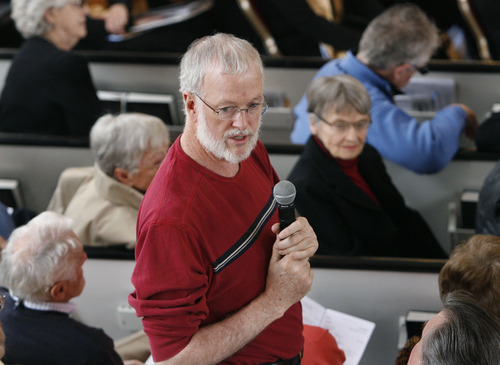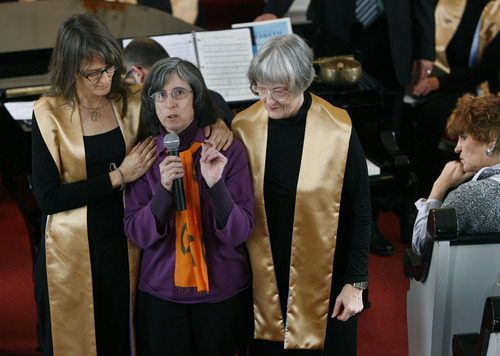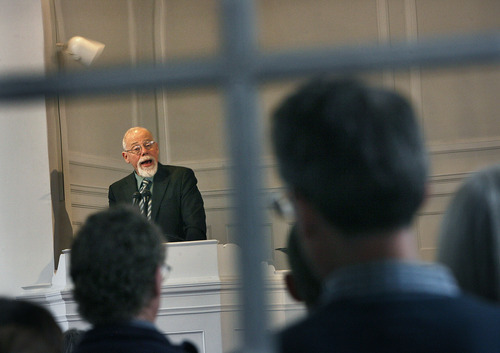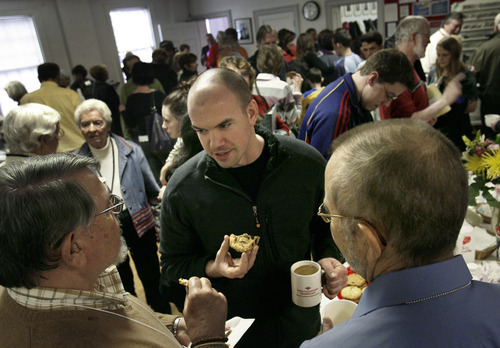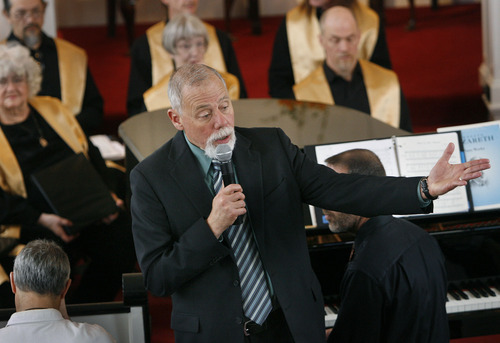This is an archived article that was published on sltrib.com in 2011, and information in the article may be outdated. It is provided only for personal research purposes and may not be reprinted.
Salt Lake City Unitarians celebrated their dedication to "earth justice" at Sunday services, their first since many of them helped provide the face of demonstrations backing eco-activist Tim DeChristopher at trial last week.
Emotions remained raw for some who had hoped their fellow member of the First Unitarian Church might escape punishment for disrupting an auction of federal oil and gas leases more than two years ago. But his conviction and possible prison term inspired many of them to expect a greater movement to reverse climate change.
"I seriously think it's really great," said Salt Lake City resident Lori Shields, who regularly attends services at the church near the University of Utah. "It's going to stay in the headlines. Whoever convicted him made a mistake. They're making a big deal out of something that's not."
In its case against DeChristopher, the government estimated he cost the U.S. Bureau of Land Management the $140,000 it spent in wages to put on a sale whose results were largely voided when other bidders learned he had bid up the prices with no plan for paying on the leases he won. He faces up to 10 years and a $750,000 fine when sentenced June 23, though U.S. Attorney Carlie Christensen has said her office won't seek the maximum.
Church members have slung a banner declaring "solidarity with Tim DeChristopher" between two trees in the corner of the chapel yard on 1300 East, and church environmental program coordinator Joan Gregory said it isn't coming down soon. If DeChristopher goes to prison in Utah, she said, members will support him in any way they are allowed, starting with regular visits. If he's incarcerated elsewhere, another congregation will help.
"Our church will be there," she said. "He is a Unitarian."
As a friend, she said tearfully, she's sad for DeChristopher. As an environmentalist, she said, she believes his conviction will help raise awareness.
"This is a victory for the climate justice movement," she told the congregation.
The Rev. Tom Goldsmith explained in an interview that environmentalism is a core component of the faith's theology, along with equal rights and a progressive view on social justice. Spirituality, he said, is life lived deliberately in touch with what's profound in the universe. That includes taking steps to protect a livable future, he said.
"We feel our Earth is in jeopardy," Goldsmith said.
From the pulpit, he related his pride in a congregation well-known for its activism, and specifically congratulated its members for leading a downtown demonstration at the trial's opening last Monday. He recalled comments from Lutheran, Baptist and Catholic clergymen who at times have envied his flock's hunger to engage in social activism.
"They speak with social conscience," he said of the other pastors, "but they do so at great risk" of backlash from the pews.
He added that the quest for social change is what holds together a church that is not dogmatic. "We share a covenant of common responsibilities."
The choir sang "What Is This Church?," a hymn declaring the congregation "a source of strength to face each doubt and sadness."
Sunday also was the beginning of an annual pledge drive for church operations, and fundraisers said they're asking for a little more this year to help build a 350-seat chapel next door with solar panels to keep the addition carbon-neutral. Gregory leapt for joy when asked if the seat total was an intentional nod to the climate movement — 350 parts carbon dioxide per million being the threshold below which some scientists say the atmosphere must reach, and hence "350" being a global rallying cry for activists. "That's beautiful," she said, but no.
After the 9 a.m. and 11 a.m. chapel services, churchgoers met in an adjoining hall as they do each week for coffee and conversation. A sign next to the coffee urn noted that it was certified fair-trade organic, that the milk came from a local dairy, and that bulk items came from Costco, a company "known for treating employees well."
DeChristopher attended the 11 a.m. service, and as he stood in line for coffee, he said the support was heartening. Between now and sentencing, he said, he'll likely spend some time in Utah's west desert, an area where he worked for two years guiding troubled teens when he first arrived here.


